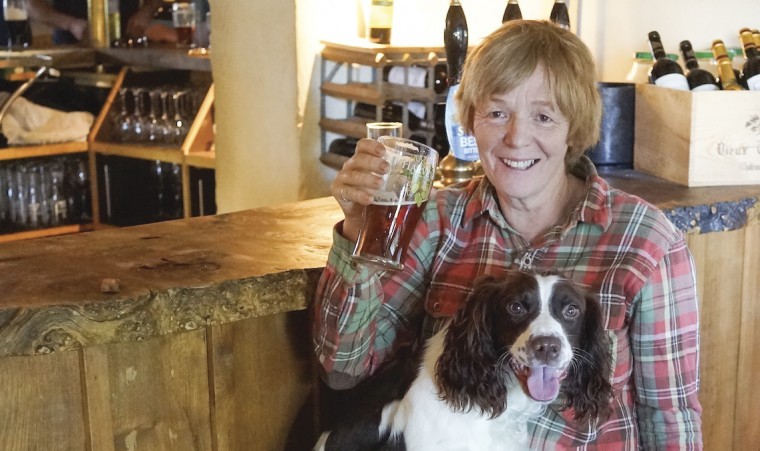As darkness falls, do you think the chickens on their perches anxiously watch the trap door? I confess to waking my husband in the early hours, asking “Did anyone shut up the Henriettas?”
I knew that I hadn’t and was gripped with fear that the foxes may be enjoying an unintended feast. Reading my new book “The secret life of cows,” it luckily mentioned the word chicken. This sparked my guilt. My sleepy better half, chivalrously went out into the night and secured our egg suppliers’ future. I think we’d better purchase a door closing mechanism that operates on a time switch: this might prove more reliable than us.
Rocky, our uninvited guest, is by contrast very reliable. She never lets anyone forget her existence. One day she just “rocked up” at the farm buildings and never left. Initially we didn’t feed her but asked around locally if anyone was missing a cat. No one claimed her and on the basis that she was helping to keep vermin down, we made a deal with Rocky. She could remain as the farm cat, catching mice and we’d provide food. Now within seconds of us arriving to feed the cattle, she has no qualms about demanding that we fulfil our side of the bargain. When the assurance assessor next asks about vermin control, Rocky will provide the answer.
Horny however is less than reliable. l’m hoping that she doesn’t let me down, as I’ve put money on her to come good. Helping to sort pens of mule tegs at Dolphin Fair, I remember someone remarking: “This is a good pen, but the one with horns spoils the look of the bunch.” My husband bought that pen of mules.
Horny is quite a character and she certainly has attitude. A twinkle in her eye and her head held high, bearing her magnificent regal horns. Last year she was too proud to let the rams near her, so in that regard she didn’t live up to her name. Nigel wanted her culled immediately. But I’ve stubbornly insisted that Horny be given one last chance. So scanning day will be an anxious time.
How reliable will Mr Gove turn out to be? The ethos of his speech at the Oxford Farming conference was “embrace change” and “enhance our natural capital.” I watched it online, agreeing with his sentiment: “We should aim for a more sustainable future to enable handing on a country and a planet in a better state than we found it.”
I was happy to hear him acknowledge that food is at the heart of farming enterprises, a fact sometimes lost on bureaucrats. Gove told delegates that he was moved by the beauty of the landscape, and admires those that work with nature and on our land. He said that he wants to see us prosper.
Gove talks the talk but can he deliver? Farming is not prospering. Gove denies condoning a race to the bottom, but what’s he doing to prevent it? Nothing is being done to constrain the power of the supermarkets. Food is undervalued, it’s too cheap, resulting in huge wastage. Gove’s upbeat message doesn’t tackle this issue. He tells farmers to be progressive and adaptable, to prepare for the challenges and opportunities that Brexit will bring. Does Gove understand how demoralising it is tending the land, caring for animals, producing quality food only to be offered dismal prices? Gove and AHDB tell farmers to increase our productivity but surely this will compound the problem: where is the incentive?
Nigel warned me that I’d need deep pockets to attend this conference. It seems there’s more money available for talking about farming than there is in actually doing it! I’d have enjoyed voicing my thoughts on the debate entitled “This house believes eating meat will be a thing of the past by 2100.” The motion was proposed by George Mombiot, a vegan, environmentalist and political activist. He gained his zoology degree at Oxford. He now writes books and a column in the Guardian newspaper. He is anti livestock farming and advocates the rewilding of the countryside. His influence is not compatible with our industry.
Contrastingly, The Oxford Real Farming Conference is more affordable, aiming to connect with emerging farmers that embrace sustainable farming methods and alternative thinking. Nigel attended this, witnessing Gove’s question and answer session. Gove admitted that cheap food has both environmental and health costs and claimed he’d like to see more public procurement of home produced quality food. Not that long ago the government encouraged the closure of school and hospital kitchens in favour of outsourcing to larger mass producing companies. Jamie Oliver has thankfully pointed out the errors of this practice.
Leaving the European Union should allow things to be done differently. According to Gove, changing the way subsidy is paid will bring down the price of land. Not if land estate agents have their way! I’m sceptical. Gove wants to see dynamic movement making it easier for new entrants into farming. That I applaud, but how?
He hesitated about his choice of words before saying: “In the past, farming has been viewed as being a smelly, dirty, frustrating business to be in.” That’s exactly what I thought when I was lying in mud upside down with a sheep and bramble bush on top of me. I was attempting to release the sheep, not entangle myself. Sometimes you just can’t gloss over the realities of farming.
There’s much that is good about farming. We need to dispel the vegan skewed propaganda, which often conflates factory farms with family farms. Educating our population about the positive aspects of agriculture could pay dividends, resulting in consumer choices driving the sustainable future of Mr Gove’s dreams.




